NIL
The College Football Transfer Portal is Moving, but to When?
The NCAA created a big mess by opening up a can of worms with little to no advanced planning. The four-letter “non-profit” threw its constituents a bone by giving them the transfer portal and NIL. It turned into an avalanche of lawsuits that threaten the entity’s existence. You cannot put the toothpaste back into the […]
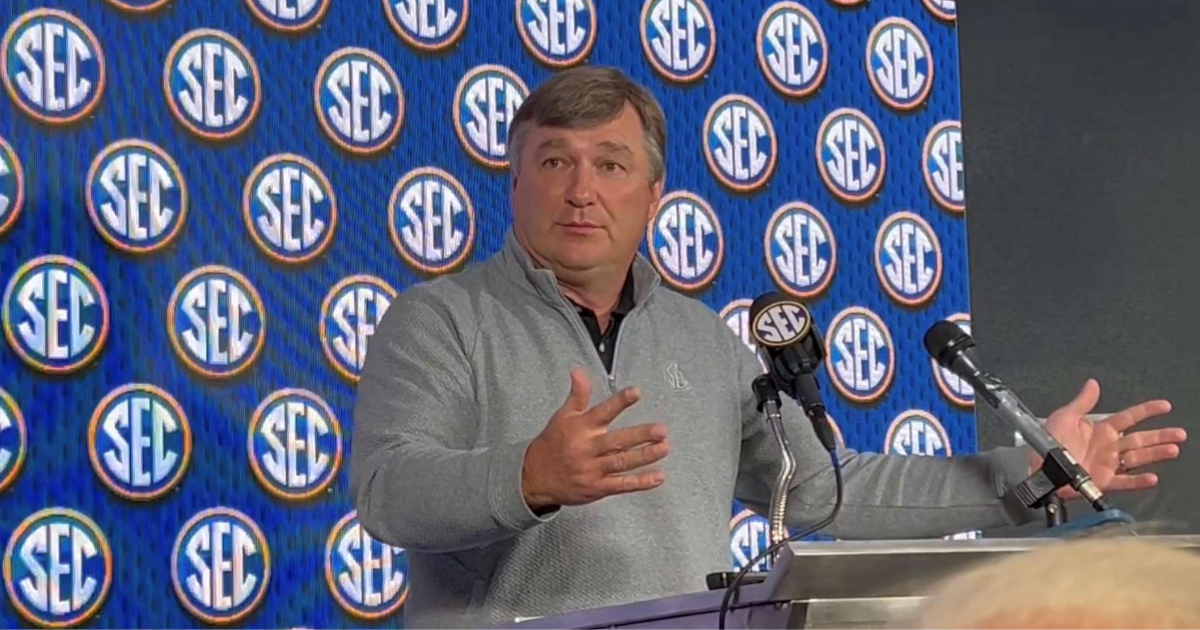
The NCAA created a big mess by opening up a can of worms with little to no advanced planning. The four-letter “non-profit” threw its constituents a bone by giving them the transfer portal and NIL. It turned into an avalanche of lawsuits that threaten the entity’s existence.
You cannot put the toothpaste back into the tube, but you can spread that toothpaste out more evenly over a couple of brushes. Right now, the sport of college football has an entire tube of toothpaste on the brush for the month of December.
After the Super Bowl, the NFL has free agency in March, followed by the draft in late April. College football ends its regular season. Less than a week later, it holds its draft (Early Signing Period), then begins its one-month free agency period (transfer portal), most of which is wrapped up before the postseason concludes.
It’s a damn mess.
The calendar is unsustainable. The powers that be tried to alleviate strain on college football coaches by moving up the Early Signing Period to the first Wednesday in December. It removed in-home visits from the recruiting process, but gave coaches more time to specifically focus on securing visits and landing players from the transfer portal.
This year’s transfer portal opened on Monday, Dec. 9. There was also a second window following spring practice. Both are subject to change and there is growing momentum around the sport to make it happen.
Transfer Portal Potential Changes
Earlier this year at the AFCA Convention, coaches lobbied to eliminate the spring transfer portal window. I think most would agree that the sport can still operate successfully with just one transfer portal window. The biggest question is when will the transfer portal open and who will make that decision? Kirby Smart has some thoughts.
“I think it’d be a great question to ask some people, but my opinion is the implementation committee, which comes from the settlement,” Smart said from the SEC spring meetings in Destin. “Appointed [10] ADs, two from each Power conference, who hear the conference’s perspective. And ultimately, those [10] ADs – which are appointed coming off the settlement – will have to make a lot of implementation decisions that are not part of the settlement. The ‘nuggets,’ let’s call it. Here’s the settlement, and then the nuggets are going to come from these [10] ADs.”
Kentucky’s Mitch Barnhart would be among the ten who would make that decision. Smart made a case for opening up the transfer portal in January.
January makes sense on the football calendar, only interfering with a few teams still playing in the CFP, but it interferes with the academic calendar. Unless schools make changes, there isn’t enough time to transfer schools before spring semesters begin.
Greg Sankey made it clear that SEC coaches want the transfer portal in January. Big Ten coaches are lobbying for March or April, and there’s one more proposal.
A May transfer portal date has been kicked around by some administrators. It makes the most logical sense in this humble blogger’s opinion. It’s the only vacant month on the calendar, and it would give the sport a nice kick in the news cycle during an otherwise dull time, right before the start of the official college football new year at spring meetings. However, coaches don’t want their future players working out at other schools in the spring. They want them on campus ASAP.
Changes are coming to the transfer portal, and like so many changes in college football, there are no easy answers.
NIL
LSU hires Sam Petitto in latest move to bolster football staff for recruiting – Crescent City Sports
(Photo: Michael Bacigalupi) Over the past two weeks, LSU has made significant moves to bolster its support and recruiting staff for the football program, reflecting head coach Brian Kelly’s ongoing efforts to modernize the program in the era of Name, Image, and Likeness (NIL), revenue sharing, and the NCAA Transfer Portal. The latest addition is […]


Over the past two weeks, LSU has made significant moves to bolster its support and recruiting staff for the football program, reflecting head coach Brian Kelly’s ongoing efforts to modernize the program in the era of Name, Image, and Likeness (NIL), revenue sharing, and the NCAA Transfer Portal.
The latest addition is Sam Petitto from Ohio State. Below is a recap of the trio of recently reported hires:
Key Hires
-
Kevin Bolden – Assistant General Manager
LSU hired Kevin Bolden, previously the Coordinator of Recruiting Strategy at Ole Miss, as Assistant General Manager. Bolden, a Mississippi native, worked under LSU’s Senior Associate Athletic Director for Football Administration, Austin Thomas, during his tenure at Ole Miss in 2022 and 2023. His expertise in transfer portal and high school recruiting is expected to enhance LSU’s recruiting operations, which have already secured the No. 1 Transfer Portal class in 2025. Bolden’s hire is part of LSU’s strategy to maintain its dominance in the transfer market. -
Jeff Martin – Rehire in Recruiting Role
LSU rehired Martin, a key assistant staffer from the 2019 national championship team, in a recruiting-focused role. Martin’s return, reported by On3’s Shea Dixon, brings familiarity and proven recruiting prowess to the program. His experience is expected to strengthen LSU’s efforts in securing top talent, particularly for the 2026 recruiting class. -
Sam Petitto – Director of Scouting and Personnel Strategy
LSU added Petitto, formerly with Ohio State, as Director of Scouting and Personnel Strategy. Petitto’s hire, reported on July 11, 2025, underscores LSU’s focus on enhancing its scouting and personnel operations. His experience with the national champion Buckeyes, where he led on-campus recruiting activities, adds a high-caliber professional to the Tigers’ front office. This move aligns with the program’s modernization efforts to navigate the evolving landscape of college football.
Context and Impact
The additions of Bolden, Martin, and Petitto signal a strategic emphasis on recruiting and personnel management, critical in an era where the transfer portal and NIL opportunities heavily influence roster construction. LSU’s recruiting success is evident in its top-five 2026 recruiting class and the No. 1 Transfer Portal class, bolstered by commitments from seven top-100 transfers.
The staff changes also reflect a broader trend of LSU targeting experienced professionals with ties to successful power conference programs and Louisiana roots, ensuring both expertise and cultural alignment. These moves are expected to support head coach Kelly’s “College Football Playoff or bust” expectations for the 2025 season, as the Tigers aim to improve coming off of a 8-4 campaign last season.
Conclusion
LSU’s recent hires of Bolden, Martin, and Petitto demonstrate a proactive approach to strengthening the program’s recruiting and support infrastructure. As the Tigers continue to reshape their personnel department, these additions position the Tigers to remain competitive in recruiting top talent and navigating the complexities of modern college football. Fans can expect these hires to play a significant role in sustaining LSU’s recruiting momentum and building a roster capable of contending for a national championship in 2025.
NIL
Q&A with UCF athletics director Terry Mohajir
FRISCO, Texas — It’s been a busy time for UCF athletics director Terry Mohajir, who has been working through the seismic changes associated with the college landscape due to the NCAA v House settlement. The Sentinel caught up with Mohajir at this week’s Big 12 Media Days to discuss several topics. Here is an abbreviated […]
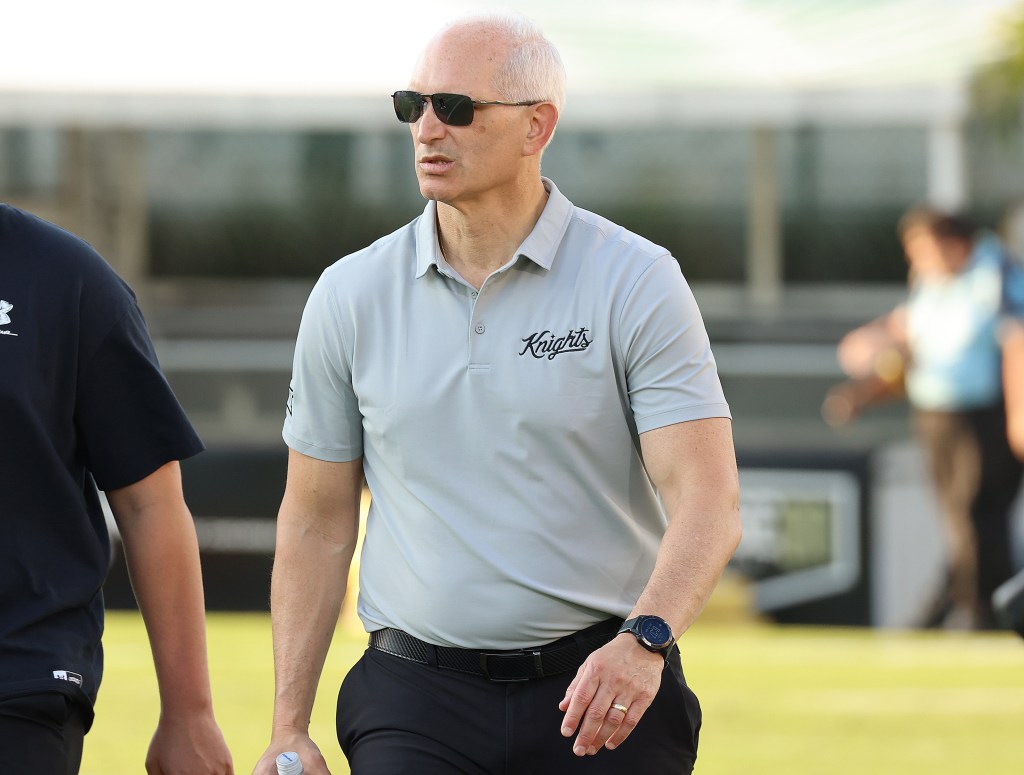
FRISCO, Texas — It’s been a busy time for UCF athletics director Terry Mohajir, who has been working through the seismic changes associated with the college landscape due to the NCAA v House settlement.
The Sentinel caught up with Mohajir at this week’s Big 12 Media Days to discuss several topics. Here is an abbreviated version of that conversation:
Revenue-sharing kicked off on July 1. What has the process been like so far at UCF?
“We’ve been working on it for almost a year and a half, so we’ve had a lot of different plans and strategies. During this whole process, we still didn’t know all the terms of the House settlement. About a month before the settlement was signed, we had a pretty good idea, but it’s been such a fluid process. We received new guidance almost weekly over the past year and a half about things they were going to do or things they were considering. It was a lot of ups and downs. I think we’re prepared and ready, and feel good about our direction.”
You’re covering the full $20.5 million revenue pool, correct?
“Yes. We’re covering the full rev-share. We worked hard at that. Next year it goes up 4% so we’ve got to put together a plan for next year.”
Florida’s Board of Governors approved an amendment that would allow public institutions like UCF to dip into auxiliary funds to help cover the cost of the revenue-share pool. Do you plan to take advantage of that rule?
“We were involved in that process. It’s another option for funding, but you have to have the funds to fund it. We’ll work with our university and we’ll be strategic about it. It’s another option to take advantage of it if you have the funds.
“We have no shortage of ideas on how to use the funds, but you have to have funds readily available that aren’t already allocated for something else. Because even in auxiliary funds, the color of money inside an auxiliary fund may be designated for a certain area that you’re not allowed to use.”
Brett Yormark eyes enhanced role for Big 12 in College Football Playoff landscape
Under the House settlement, name, image and likeness (NIL) deals are processed through a new program in NIL Go, which serves as a clearinghouse for these deals. How has that gone so far in the process?
“We’ve already put five deals through there. Four have been approved and one is pending. The range has been $600 to $10,000 and we’ve had a $10,000 deal go through so far.
“It’s working [the process] and it’s doing what it’s supposed to do, that’s why I’ve been so optimistic about this new age of college athletics and this new age of college sports. The College Sports Commission that we have, I think it’s working. So, we’ll see. We’re doing it the right way and hopefully everybody continues to do so and follows the terms of this House settlement.”
What are the latest updates on the ongoing construction projects?
“As far as I know, we’re still on track. I haven’t heard anything different, and I think we’re in good shape.”
Are there other projects that you’re working on as well?
“We’re moving along the promenade from Ken Dixon Way to the stadium. Then, we’re creating another pathway from behind the soccer field and the parking garage, which will run from the Village area to help move fans along. They don’t want to walk in the grass and stuff.
“We hired a company to do a master plan for us for athletics to reimagine the whole athletics village area. That’s everything from baseball to softball, the whole space.”
The school revealed new uniforms for this upcoming football season. What’s been the reaction?
“Contrary to what people think, I do not pick the uniforms each week. I let the coaches and the team’s leadership handle all that. My primary goal is to adhere to the black and gold theme. We have such great colors. I want us to stick with black uniforms as much as possible. … You look at our league, they all want black uniforms. Those who don’t have black in their palette wish to be black. So we’re very fortunate to have that.
“Our design team is working with Nike and they’ve done a great job. We still have some more reveals to go, which I think our fans will like.”
Have there been discussions about doing a Space Game Trophy for the Houston game?
Scott Frost: Low expectations for UCF are chance to embrace underdog role
“We’re open to anything. Whenever you’re looking at that kind of content, you want to monetize it. Do we want to relinquish our university designation to share it with someone else? Because if you have an annual space game, you have to play it annually and that’s not a guarantee. We didn’t play Houston last year, so that would mean we would have to rotate. I mean, as much as we’re open to it, I’m not sure if it’ll really works.”
Commissioner Brett Yormark discussed the possibility of playing more international games. Are you in favor of such a move?
“I have raised my hand like [Arnold] Horshack from ‘Welcome Back, Kotter’ every time they talk about international games. Yes, absolutely.
“The biggest thing for us is we don’t want to give up a home game, because we’re so dependent on our football game receipts. Obviously, some of the other schools have different types of funding models at their university, so they might be willing to give up their home game, but I think there’s a real, real opportunity.”
Please find me on X, Bluesky or Instagram @osmattmurschel. Email: mmurschel@orlandosentinel.com. Sign up for the Sentinel’s Knights Weekly newsletter for a roundup of all our UCF coverage.
NIL
Mike Gundy points to moment when he realized NIL wouldn’t ‘go away,’ forcing Oklahoma State coach to adapt
Mike Gundy is finally coming around on NIL and revenue-sharing after years of hesitation, but the longtime Oklahoma State football coach didn’t have much choice. Schools are now forced to adapt to the rapidly evolving college football landscape or risk being left behind. Initially, Gundy, like many of his peers, hoped these changes were temporary […]

Mike Gundy is finally coming around on NIL and revenue-sharing after years of hesitation, but the longtime Oklahoma State football coach didn’t have much choice. Schools are now forced to adapt to the rapidly evolving college football landscape or risk being left behind. Initially, Gundy, like many of his peers, hoped these changes were temporary — a passing trend that wouldn’t fundamentally alter how college football operates. But the momentum kept building and the landscape kept shifting.
What once seemed like a distant possibility became an urgent necessity: embracing NIL, aggressively managing transfers and investing in new strategies to keep programs competitive. The recent House v. NCAA settlement — which ushers in an era of direct revenue-sharing with athletes — only reinforced the reality that college football is now a business, and coaches like Gundy can no longer afford to sit on the sidelines.
“I almost just thought, ‘This will go away. Surely this can’t last,'” Gundy told On3 this week at Big 12 Media Days. “And then it just kept building momentum. And then after a point, about 18 months ago, I said, ‘This is not going away. We’re going to have to make some real adjustments here.'”
Oklahoma State welcomed 41 incoming transfers as part of its 2025 class. That tied for the third-largest haul of any Power Four program this cycle. And it’s more than the total number of incoming transfers Oklahoma State had across the previous six cycles since the NCAA transfer portal debuted in October 2018.
‘I get it’: Mike Gundy unfazed by pressure as grizzled Oklahoma State coach stares down make-or-break season
Shehan Jeyarajah
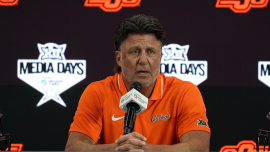
What finally pushed Gundy to shift his philosophy?
“So, the truth be known, this portal class from January is the first class that we ever bought,” Gundy said. “We’d not bought portal kids. That hurt us the last year or so from a depth standpoint.”
That hard lesson came during Oklahoma State’s disastrous 2024 season, when the Cowboys stumbled to a 3-9 record and missed a bowl game for the first time in nearly two decades. It was an obvious low point for a program known for winning in the Gundy era.
“And that was nobody’s fault,” Gundy admitted, acknowledging that his refusal to spend on portal players had backfired. “That’s not the administration’s fault, not the donors’. That was really kind of my fault because what I had done was taken money that had been raised through donations and spread it amongst the troops somewhat evenly to the current players. We didn’t go out and solicit players and pay them to come to our team. We did that starting in December, which, I think we all would agree, if you don’t do that, you’re not going to survive.”
Despite the large volume of incoming transfers, Oklahoma State ranks No. 32 nationally in the portal team rankings for the 2025 class and fifth in the Big 12.
NIL
Polarizing CFB Head Coach Calls for Salary Cap
The landscape of college sports appears to be changing daily and one of the most polarizing head coaches in college football is calling for more changes to help deal with revenue sharing and NIL payments. Colorado head coach Deion Sanders is advocating for a salary cap to provide an even playing field in a sport […]

The landscape of college sports appears to be changing daily and one of the most polarizing head coaches in college football is calling for more changes to help deal with revenue sharing and NIL payments.
Colorado head coach Deion Sanders is advocating for a salary cap to provide an even playing field in a sport that is new to paying athletes.
“I wish there was a cap,” Sanders said during the Big 12 media days this week. “Like, the top-of-the-line player makes this, and if you’re not that type of guy, you know you’re not going to make that. That’s what the NFL does.
“So the problem is, you got a guy that’s not that darn good, but he could go to another school and they give him a half million dollars. You can’t compete with that. And it don’t make sense.”
“All you gotta do is look at the [CFP] and see what those teams spent, and you’ll understand darn well why they’re in the playoffs.”
Deion Sanders on NIL and the current state of college football. pic.twitter.com/y6A5C3dWUP
— ESPN (@espn) July 9, 2025
Sanders, who is now in his third year with the Buffaloes, is looking for a system that resembles the NFL.
“I wish it was truly equality,” he said. “Now they go back to doing stuff under the table. They go back to the agents. Now you’ve got parents trying to be agents, you’ve got the homeboys trying to be agents, you’ve got the friends trying to be agents. You got a lot of bull junk going on. And quite frankly, we’re sick of it. I’ll say it for everybody: We’re sick of it.”
Starting on July 1, 2025, universities were allowed to start sharing revenue with student-athletes for the 2025-26 school year, per the House Settlement. Schools can share up to $20.5 million with a majority of athletic department expected to allocated 75 percent of that with the football program, including at Pitt.
However, programs will still work with third-party NIL collectives to bring in bigger deals for student-athletes that can surpass the revenue-sharing money. ‘NIL Go’ was created by the College Sports Commission and Deloitte to help ensure fair market value for deals.

NIL
Deion Sanders Advocates For Salary Cap In College Football | News
To keep college football competitive, Deion Sanders is advocating for a salary cap for the sport. During the Big 12’s Media Day on Wednesday (July 9), Coach Prime expressed his concern about the financial landscape of college football and the impact of NIL (Name, Image, and Likeness) on competition. “I wish there was a cap. […]
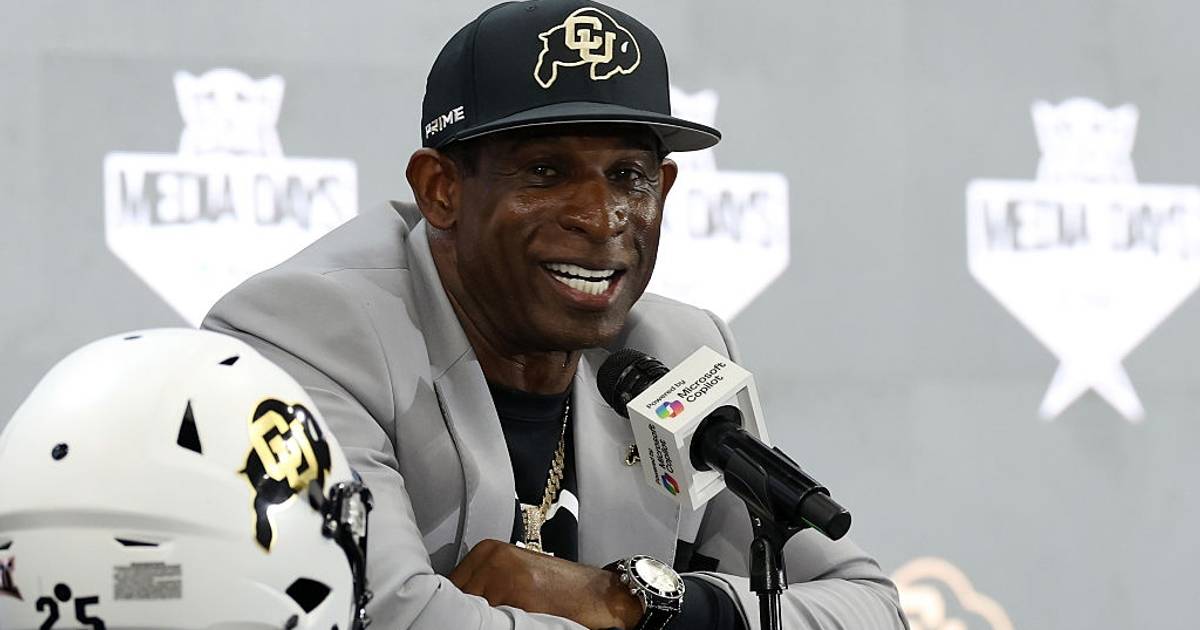
To keep college football competitive, Deion Sanders is advocating for a salary cap for the sport.
During the Big 12’s Media Day on Wednesday (July 9), Coach Prime expressed his concern about the financial landscape of college football and the impact of NIL (Name, Image, and Likeness) on competition.
“I wish there was a cap. The top-of-the-line player makes this, and if you’re not that type of guy, you know you’re not going to make that. That’s what the NFL does,” Sanders explained. “So the problem is, you got a guy that’s not that darn good, but he could go to another school and they give him a half million dollars, and you can’t compete with that. And it don’t make sense.”
“All you have to do is look at the playoffs and what those teams spend, and you understand darn near why they’re in the playoffs,” he continued. “It’s kind of hard to compete with somebody who’s giving $25 to $30 million to a freshman class. It’s crazy.”
Coach Prime also spoke about tampering with rosters and backroom deals, which he claims are ruining the sport.
“I would see a player and see he got an offer from another school, and I’m trying to figure out how is that possible when the guy isn’t in the portal? How is that?” Sanders said. “Now, if that was one of my players, y’all would be all over it. I’m trying to figure out how can somebody say, ‘You’ve got a $5 million offer.’ How? And the kid isn’t in the portal. We need to be upright and upstanding.”
“I wish it was truly equality. Now they go back to doing stuff under the table. They go back to the agents. Now you’ve got parents trying to be agents, you’ve got the homeboys trying to be agents, you’ve got the friends trying to be agents,” Sanders continued. “You got a lot of bull junk going on. And quite frankly, we’re sick of it. I’ll say it for everybody: We’re sick of it.”
Many took issue with Sander’s stance on a college football salary, arguing that his views are filled with hypocrisy. Noted journalist Rob Parker said Sanders was “ludicrous” for his salary cap remarks.
“Shame on you for being a hypocrite,” Parker said on his podcast ‘The Odd Couple with Rob Parker and Kelvin Washington’. “Did you call for a cap when the coaches were making $20 million, $18 million? Where was the coach’s cap? Is it fair that Nick Saban was making a gazillion dollars off the kids’ backs?”
“Where was that cap, Deion? How come you didn’t call for this when your boys, your kids, were in college? Shedeur, why didn’t Shedeur give the money back and say, ‘You know what, I’m just playing for the hell of it? My dad’s a former NFL player, we got loot, I don’t need money,” Parker continued. “‘I’m here to play football.’ Did Shedeur take the money? This is ludicrous.”
NIL
BBC retains rights to major UK athletics events in five
The BBC UK public-service broadcaster will continue to air the country’s biggest athletics events after securing a new five-year rights deal with Athletic Ventures, UK Athletics’ (UKA) commercial joint venture alongside London Marathon Events (LME) and Great Run Company (GRC). The deal, running until 2029, covers live and highlights rights and will see the broadcaster air […]



The BBC UK public-service broadcaster will continue to air the country’s biggest athletics events after securing a new five-year rights deal with Athletic Ventures, UK Athletics’ (UKA) commercial joint venture alongside London Marathon Events (LME) and Great Run Company (GRC).
The deal, running until 2029, covers live and highlights rights and will see the broadcaster air competitions including the Diamond League’s London Athletics Meet, the UK Athletics Championships, and the UK Athletics Indoor Championships on its linear channels, iPlayer streaming service, and BBC Sport website.
UKA chief executive Jack Buckner said: “This five-year deal is testament to our long-term vision and the proven appetite for athletics in this country. In an increasingly competitive sports market where broadcast opportunities can be short-term or uncertain, this extended partnership with BBC Sport provides exciting continuity for the sport, our athletes, and our fans.
“The BBC remains the gold standard in reach and coverage, and this agreement ensures British athletics will continue to have a strong, consistent platform to engage millions of viewers across the UK.”
The new deal builds on UK Athletics’ previous deals with the broadcaster, including a six-year agreement that ended in 2020, worth around £3 million ($3.8 million) per year.
Since then, the BBC has signed short-term rights deals with UK Athletics to cover its events in 2022, 2023, and 2024.
The new deal also adds to the BBC’s portfolio of athletics rights, including the Olympic Games, World Athletics Championships, European Athletics Championships, Diamond League, and London Marathon.
The first event under the new contract will be the Diamond League’s Novuna London meet on July 19 at the London Stadium.
Athletic Ventures was formed last year to support the continued promotion of athletics in the UK.
Specifically, it functions as the organizer of London’s annual Diamond League athletics meetings and next year’s European Athletics Championships, which will be held in Birmingham, England. It is also responsible for the UK’s bid to host the 2029 World Athletics Championships.
As a commercial joint venture, it mainly works to secure brand partners for all three bodies, allowing potential investors to sponsor events from the grassroots level up to the elite tier.
Meanwhile, the bidding process for the 2029 and 2031 World Athletics Championships opened last month, with the pre-qualification form submission deadline for both events earmarked for October 1.
UK Athletics announced its intention to host the 2029 World Athletics Championships in March, alongside the UK Sport national body.
-

 Technology2 weeks ago
Technology2 weeks agoPet fitness and wellness trends for a healthier and happier dog
-

 College Sports2 weeks ago
College Sports2 weeks agoWAC to Rebrand to UAC, Add Five New Members in 2026
-

 Motorsports2 weeks ago
Motorsports2 weeks agoWhy Cosmetics are Making Up for Lost Time in Women’s Sports
-

 College Sports3 weeks ago
College Sports3 weeks agoAlabama Basketball
-

 Professional Sports3 weeks ago
Professional Sports3 weeks agoFrancis Ngannou sends Dana White a message following Jon Jones' shock UFC retirement
-

 College Sports2 weeks ago
College Sports2 weeks agoA new era of Dickinson hockey begins behind the bench – The Dickinson Press
-
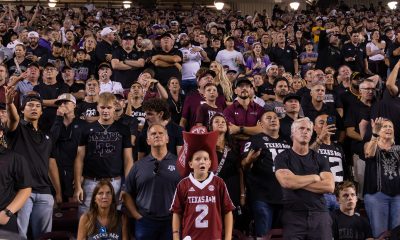
 Sports3 weeks ago
Sports3 weeks agoSEC Conference imposing a fine will create the opposite effect.
-

 Health2 weeks ago
Health2 weeks agoFlorida assault survivor shares hope for change with new mental health law
-

 Motorsports2 weeks ago
Motorsports2 weeks agoNASCAR This Week – Patriot Publishing LLC
-

 Youtube2 weeks ago
Youtube2 weeks agoFunniest MLB rain delay moments


































